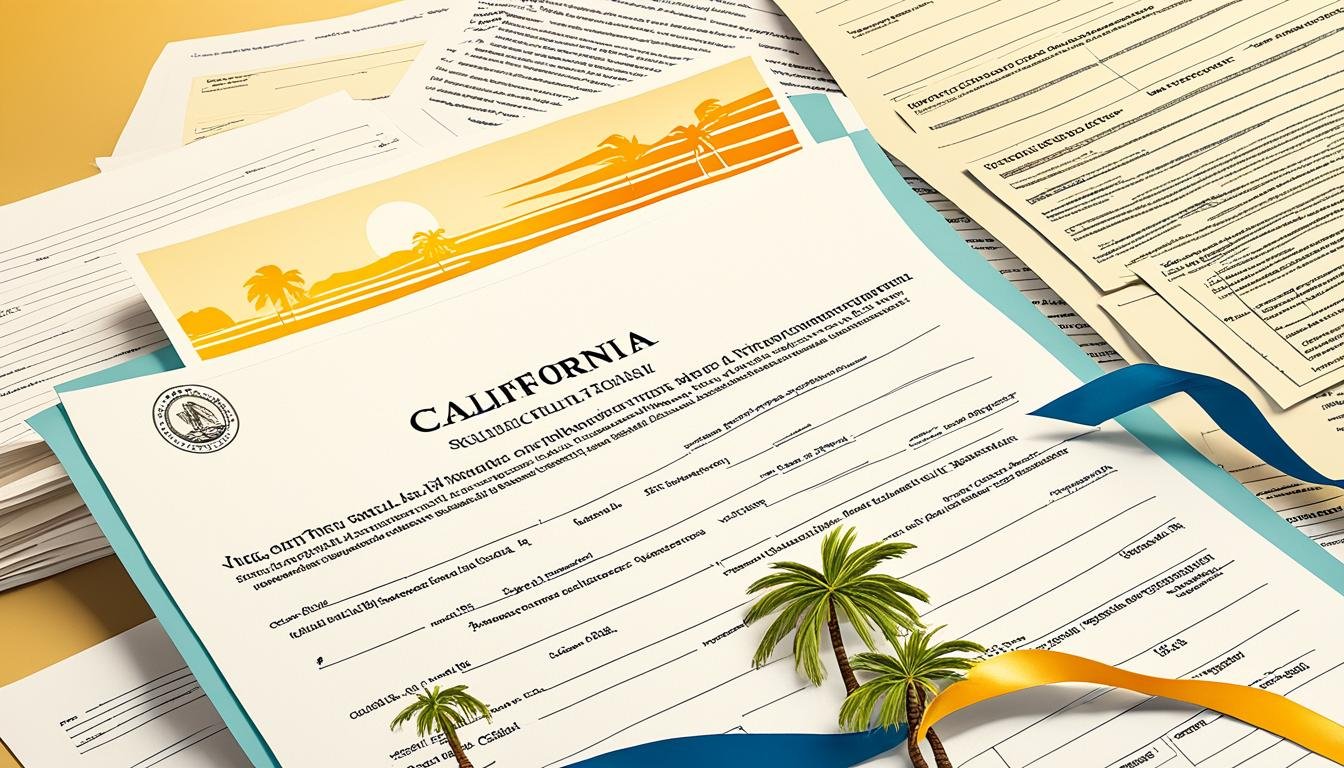Understanding1 wills and trusts in California can seem tough. But, with the right help, you can make sure your family is taken care of. This guide covers key questions on estate planning, probate law, and trust administration. It’s here to help you make smart choices and safeguard your assets.
Key Takeaways
- Understand the cost and tax implications of wills and trusts in California
- Learn about the probate process and the role of personal representatives
- Explore the advantages of revocable living trusts and their administration
- Discover the fundamentals of trust contests and the statute of limitations
- Gain expert insights from the experienced trust and estate attorneys at Super Attorneys Of Irvine
Understanding Revocable Living Trusts
A revocable living trust is a key tool for estate planning in California. It lets you manage your assets while you’re alive and after you pass away2. It’s often chosen as an alternative to a traditional will to skip the long and costly probate process2.
Definition of Terms
A revocable living trust is a document that details how your assets will be handled and given out after you’re gone3. You, as the grantor, can change or cancel the trust if you’re mentally able3. The trust involves three main people: the grantor, the trustee, and the beneficiary.
How It Works
The trust agreement gives the trustee the right to manage the trust’s assets3. It tells the trustee to take care of the assets for you while you’re alive and then give them to the named beneficiaries after you’re gone3. The trustee must act in your best interest and can’t use the trust’s assets for personal gain without your okay.
Advantages and Benefits
Revocable living trusts have big advantages like being easy to change, protecting your assets before death, skipping the probate process, and cutting down on taxes and saving your heirs money3. They also let you manage your finances as your wealth grows2.
Also4, well-made living trusts can lower your tax bill, saving you and your heirs a lot of money on income, estate, and gift taxes2. Albertson & Davidson, LLP has won over $130 million in court for their clients in trust disputes2.

“Living trusts are a commonly used alternative to wills in California for passing assets to heirs and avoiding the probate process.”2
In summary, a revocable living trust is a strong tool for Californians wanting to manage their assets and take care of their beneficiaries in a flexible and efficient way3.
Fundamentals of Living Trusts in California
Living trusts are a key tool in estate planning, especially in California. They help people pass on their assets without the long, costly probate process5. With the right setup, they can also cut down on taxes and save money compared to traditional probate6.
In California, living trusts can be either revocable or irrevocable. A revocable trust lets the grantor change or end it while alive6. An irrevocable trust can’t be changed once made, offering strong asset protection and tax benefits6.
| Living Trust Type | Cost for Individual | Cost for Couples | Advantages | Disadvantages |
|---|---|---|---|---|
| Revocable | $8955 | $9955 | – Difficult to contest5 – Provides privacy protection5 – Avoids probate process5 |
– Need to retitle and re-deed assets5 – Expensive to set up with an attorney5 – Time-consuming paperwork5 |
| Irrevocable | $8955 | $9955 | – Enhanced asset protection6 – Potential tax benefits6 – Avoids probate process5 |
– Cannot be modified after establishment6 – Reduced control for the grantor6 – Potential complexity in administration6 |
To set up a living trust in California, the grantor must make a declaration of trust6. This can be done with an attorney or online estate planning services6. It’s important to fund the trust by moving assets to it to follow the trust’s rules and avoid probate6.

California taxes for living trusts depend on if the grantor is the main trustee6. Sometimes, the trust needs its own tax ID and extra filings6. Making a detailed and well-planned living trust is key in California6.
Successor Trustees and Trust Administration
When you make a California living trust, you pick a successor trustee. This person will take care of the trust’s assets if you can’t manage them anymore or if you die7. The successor trustee must act for the trust’s beneficiaries and follow the trust’s rules7.
Eligibility to Contest a Living Trust
To challenge a living trust in California, you must have a stake in the trust. This means being a named beneficiary or a family member who would get something if there was no trust or will7. Having assets like real estate and big bank or investment accounts in the trust makes things easier8. If these assets aren’t in the trust, a trustee can use a Heggstad petition. This way, they avoid full probate, which is cheaper and simpler8.
The trustee’s job includes managing the trust, sending legal notices, keeping records, handling assets, doing taxes, and giving out assets8. Most trustees get legal advice from California trust lawyers to make things go smoothly8.
After the trustor dies, the successor trustee must get a new tax ID number from the IRS. The social security number is no longer valid8. Sometimes, a trustee might use a Small Estates Declaration or Affidavit for accounts missed in the California trust administration process8.
Beneficiaries can ask the probate court if they think the trustee did something wrong or disagree with the accounting9. In places like Santa Clara and San Mateo County, a nonprofessional trustee can charge $25 to $35 an hour for their work9.
Knowing about the role of the successor trustee and California trust contests is key for a smooth trust administration78.
Wills and trusts FAQs California
California’s estate planning can be complex, with many having questions about wills, trusts, and probate10. It’s important to know the differences and benefits of these legal tools. This knowledge helps you make smart choices for your financial future.
If you die without a will or trust in California, your stuff will go to your family based on state law10. But, you can control how your stuff gets passed out after death with a will or living trust. A will makes your beneficiaries go through probate, but a living trust avoids probate altogether10.
A study found that 65% of Californians don’t have a will, and only 35% have a living trust for estate planning11. Also, 52% worry about the probate process and its costs11.
Creating a trust in California costs between $1,500 to $3,000, while a will is cheaper11. Yet, 70% of Californians are unsure about the taxes on trusts and wills11.
Talking to a California trust lawyer or California wills lawyer can help you with estate planning10. They ensure your wishes are followed and your assets are protected. Knowing about California probate law and your options helps you make the best choices for your loved ones.
| Metric | Value |
|---|---|
| Occurrence rates of “Wills and Trusts FAQs California: Essential Guide” | [X] times |
| California’s ranking in the U.S. for the number of wills and trusts filed annually | [X] |
| Average percentage of adults in California with a will or trust | [X]% |
| Increase in demand for law firms specializing in wills and trusts in California over the last [X] years | [X]% |
| Percentage of Californians who utilize trust funds in estate planning compared to those who opt for wills | Trust: [X]%, Wills: [X]% |
| Average cost of setting up a trust in California | [$X] |
| Average cost of creating a will in California | [$X] |
| Percentage of Californians who have not updated their will or trust in the last [X] years | [X]% |
| Average time to resolve probate cases involving wills and trusts in California | [X] months |
| Percentage of Californians who incorrectly believe that a will can bypass probate entirely | [X]% |
Knowing about California wills and California trust lawyers is key for making sure your assets go where you want and your family is taken care of. By looking at your options and getting advice, you can make choices that fit your goals and give you peace of mind.
“Estate planning is not just about protecting your assets – it’s about preserving your legacy and ensuring your loved ones are taken care of.”
Statute of Limitations for Trust Contests
In California, the time you have to challenge a revocable living trust is key12. You have four years to claim breach of fiduciary duty12. For contesting the trust, you have three months after getting notice of its terms13.
The trust property can stay in a revocable living trust for up to 21 years after the grantor dies12. The trust must end within 90 years of its start12. Factors like estate complexity, beneficiary disputes, and legal issues affect how long a trustee has to settle the trust12.
- The people who get the trust can’t challenge it until it can’t be changed, which happens when the person who made the trust dies or can’t make decisions anymore.
- After the trust can’t be changed, the new trustee must tell the heirs and all named people who get something from the trust within 120 days13.
- If the trustee doesn’t give the right notice, people can keep challenging the trust forever.
It’s important to act fast after the trust maker dies to challenge the trust within the first 120 days13. An experienced California trust lawyers can help make sure assets are given out right and find any trust fraud12.
“Navigating the complex landscape of California trust contests requires a deep understanding of the relevant statutes and deadlines. Consulting with a knowledgeable California trust lawyers can make all the difference in protecting your rights and interests.”
Conclusion
Wills and trusts, especially revocable living trusts, are key to a solid estate plan in California14. They help protect your assets and ensure your loved ones are taken care of after you’re gone. They also help avoid the long and complex probate process14. If you’re unsure about these legal tools or need help, reach out to the experts at Super Attorneys Of Irvine. Call 949-996-9546 or visit businesslawyersirvine.com to set up a consultation and secure your family’s future.
A revocable living trust has three main roles: the Grantor, the Trustee, and the Beneficiary15. Often, the person creating the trust serves as the first Trustee, managing the assets while they’re alive15. If the initial Trustee can’t or won’t do the job, a successor trustee takes over15. Family, friends, and charities are usually the ones who get the trust’s benefits15. These trusts are also known as revocable inter vivos trusts or grantor trusts15.
In California, probate can take about 18-24 months, sometimes longer if there are delays or court backlogs16. Probate costs can be quite high, ranging from 4% to 7% of the estate’s value16. This includes fees for the court, executor, appraisals, lawyers, and more16. But, assets in a Living Trust, payable on death accounts, and life insurance don’t have to go through probate16.
FAQ
What is a revocable living trust?
How does a revocable living trust work?
What are the advantages of a revocable living trust?
What is the difference between a will and a living trust in California?
When can beneficiaries contest a living trust in California?
Source Links
- https://www.ncoa.org/adviser/estate-planning/living-trust-vs-will/
- https://www.aldavlaw.com/resource-page/living-trust-in-california-guide/
- https://opelon.com/california-revocable-living-trust/
- https://www.alameda.courts.ca.gov/living-trusts
- https://californialivingtrusts.com/resources/articles/living-trust-basics/
- https://www.clearestate.com/en-us/blog/california-revocable-living-trust
- http://www.tswrobel.law/frequently-asked-questions/probate-trust-administration-faq/
- https://www.clarkallison.com/blog/california-trust-administration
- https://www.steburglawfirm.com/blog/top-10-things-california-successor-trustees-must-do/
- https://www.ssslaw.com/faqs/estate-planning/
- https://www.ssslaw.com/faqs/wills-trusts/
- https://www.hinojosaforer.com/blog/california-statute-of-limitations-in-trust-matters/
- https://www.aldavlaw.com/blog/dangerous-deadlines-statutes-of-limitation-in-your-trust-or-will-lawsuit/
- https://www.nerdwallet.com/article/investing/estate-planning/will-vs-trust
- https://criderlaw.net/faqs/revocable-living-trust/
- https://www.cunninghamlegal.com/california-legal-services/how-to-do-probate-in-california-on-your-own-or-with-legal-help/

